Is Ghee Beneficial For The Skin?
Discover the hidden benefits of ghee in making your skin look radiant and healthy.
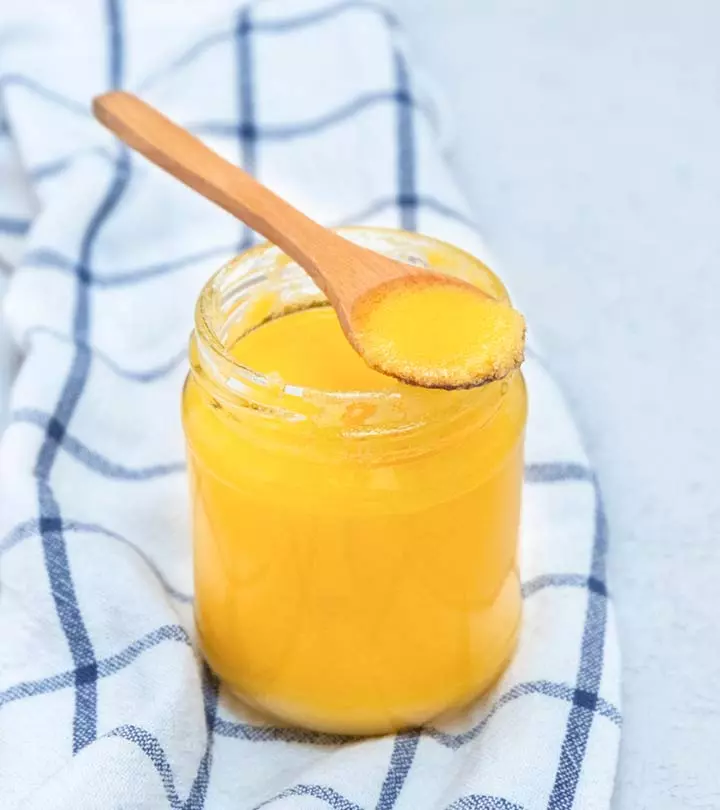
Image: Shutterstock
Ghee has been a staple in Indian households for a long time. It has multipurpose uses that include adding flavor to the dishes, improving digestion, and healing the skin. You can also use ghee for skin care woes and achieve radiant skin in no time. Topical and oral use of ghee benefits the skin in many ways. However, there is not enough scientific evidence to prove the benefits of ghee for your skin.
If you want to try using ghee for your skin, we can help you with the proper steps. Read this article to know more about how ghee benefits your skin, its use, and its side effects. Scroll down.
 Know Your Ingredient: Ghee
Know Your Ingredient: GheeWhat Is It?
A white or yellow clarified butter made from cow or buffalo milk,
What Are Its Benefits?
It moisturizes dry skin, reduces dark circles, and softens chapped lips.
Who Can Use It?
Anyone can use it except people with oily or acne-prone skin, milk allergy, and eczema.
How Often?
You can apply ghee thrice a week.
Caution
Excess application may cause clogged pores and increase the risk of fungal infections.
In This Article
Is It Good To Apply Ghee On Your Face?
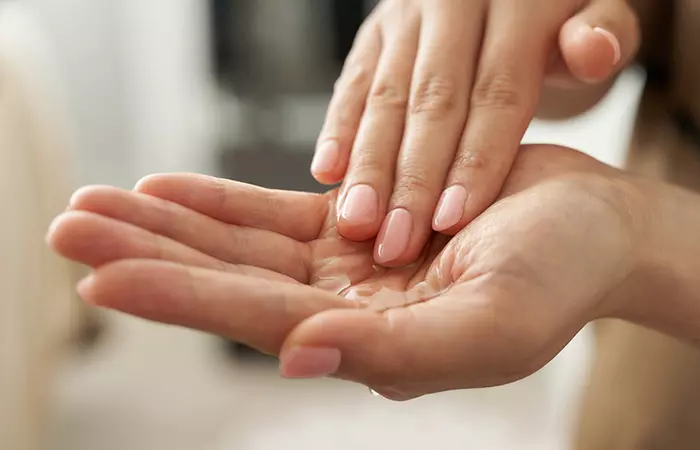
No. The topical application of ghee may trigger the overgrowth of Malassezia furfur, a naturally occurring yeast-like fungus, on the skin. Like any other clarified butter, ghee contains fats and cholesterol, and Malassezia feeds on lipids. A study observed that Malassezia could flourish in ghee or butter (1).
Overgrowth of Malassezia furfur can cause pityriasis versicolor (yeast infection that causes flaky patches) and seborrheic dermatitis (1). If you have oily and acne-prone skin, applying ghee can aggravate the issue. Moreover, it may also clog the skin pores and cause breakouts.
 Did You Know?
Did You Know?However, many people have used ghee on their skin, claiming it to function like a natural moisturizer. Let’s take a look at the benefits of ghee for the skin and if it actually promotes healthy skin.
Key Takeaways
- Ghee has several benefits on the skin, like moisturization and wound healing.
- Though beneficial, applying it to the face may trigger acne breakouts.
- However, you can use ghee with honey, gram flour, honey, or turmeric to get the best results.
The Benefits Of Ghee For The Skin
Ghee is made up of carotene, butyric acid, omega-3 fatty acids, vitamin A, B12, D, E, and K, and offers the following benefits:
1. May Moisturize The Skin
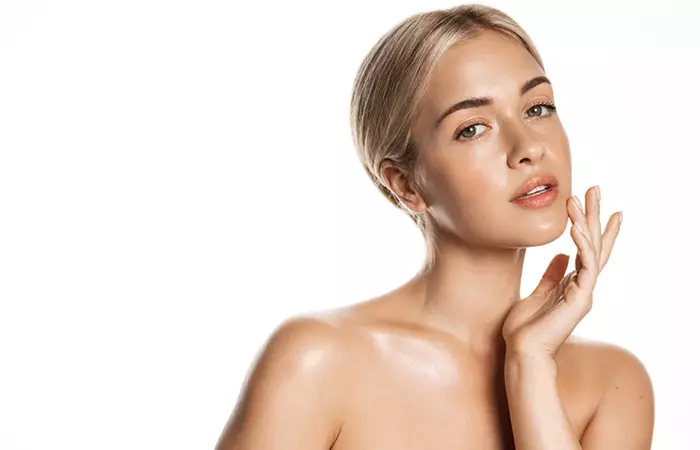
A study found that ingesting ghee can keep the skin moisturized and reduce erythema (dryness), scaling, and itching associated with dry skin. Another study evaluated the effect of a ghee-based cream and concluded that it could help hydrate the skin (2), (3).
2. Prevents Dark Circles
Anecdotal evidence suggests that ghee’s nourishing and hydrating properties may help maintain the delicate under-eye area and eliminate dark circles.
3. Wound Healing
A study found that a ghee and honey dressing can facilitate wound healing. The dressing has antimicrobial properties and is effective on drug-resistant microbes, promotes healthy tissue growth on the wound, and reduces foul smell, pain, and ulcers (4).
4. Good For Chapped Lips
The phospholipids from ghee help retain moisture in the skin, making ghee beneficial for cracked or dry lips.
Deepica Mutyala, a vlogger, spoke about how ghee healed her chapped lips. She said, “3 days of using this and my lips are healed. No cuts (i).”
Ghee may be beneficial for the skin when used with different ingredients and as a part of a skin care formulation. There is no scientific proof supporting the benefits of topical ghee application when used alone. All evidence is based on individual experiences. If you are not allergic to milk and want to give this age-old remedy a try, we have some recipes. Scroll down.
How To Use Ghee For Skin
1. Gram Flour And Ghee
Gram flour is used in herbal face masks. It exfoliates the skin, reduces oiliness, and minimizes pimples (5). The lactic acid present in milk may work as a mild exfoliator and stimulate new cell growth (6).
What You Will Need
- 2 tablespoons of ghee
- 2 tablespoons of gram flour
- 1 tablespoon of milk
What You Have To Do
- Mix all the ingredients and prepare a thick paste.
- Apply the paste all over your face and neck.
- Leave it on to dry and wash it off with cold water.
How Often To Use
Use this two times a week.
2. Honey And Ghee
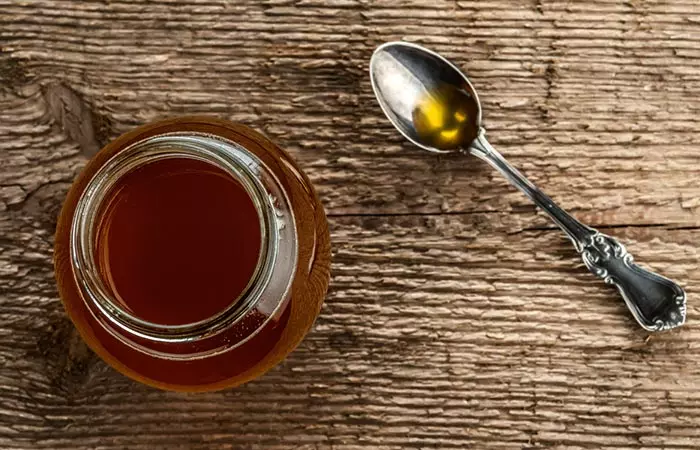
Honey has antioxidant, antimicrobial, and wound-healing properties (7). The antioxidants in it can help fight free radicals, improve skin health, and minimize signs of aging. This face mask can moisturize your skin.
What You Will Need
- ½ tablespoon of ghee
- ½ tablespoon of honey
What You Have To Do
- Mix both the ingredients.
- Apply this mixture all over your face and neck.
- Leave it on for 15-20 minutes.
- Wash your face with lukewarm water.
How Often To Use
Use it once a day.
3. Turmeric And Ghee
Topical and oral turmeric have therapeutic benefits. It can help soothe skin conditions like atopic dermatitisi A chronic, non-contagious inflammatory condition that causes dry and itchy rashes on the skin. , psoriasisi An autoimmune disorder where the body produces skin cells faster than normal, leading to scaly, itchy, and patchy buildup. , radiodermatitisi Skin rashes and reactions caused by radiation exposure, a common side effect of radiotherapy for cancer treatment. , and photoaging (8). This face mask can soothe and heal your skin and facilitate natural beauty.
What You Will Need
- 1 tablespoon of ghee
- ½ tablespoon of turmeric powder
What You Have To Do
- Mix the ingredients and apply the mixture to your face and neck.
- Leave it on until it dries.
- Wash your face with cold water.
How Often To Use
Use it twice a week.
4. Ghee For Dark Circles
Applying ghee can soften and hydrate the delicate under-eye area and improve dark circles.
What You Will Need
- 2-3 drops of ghee
What You Have To Do
- Massage the ghee under your eye.
- Leave it on overnight.
- Wash your eyes with cold water in the morning.
How Often To Use
Use it once a day.
5. Sandalwood Oil And Ghee
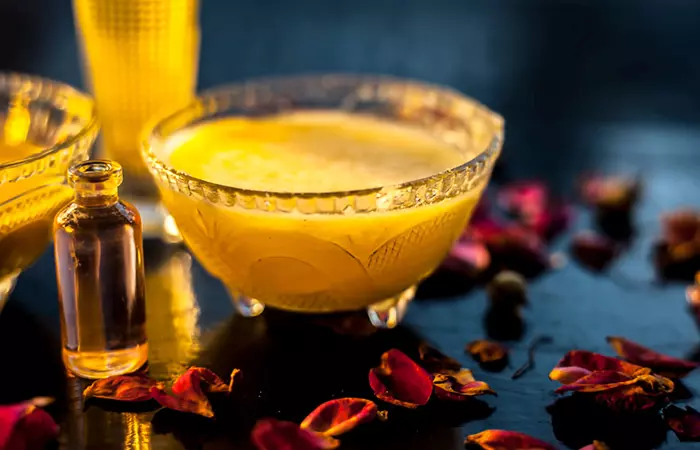
Sandalwood oil has antimicrobial and anti-inflammatory properties. It has shown promising results in soothing acne, psoriasis, eczema, and warts (9). Turmeric has therapeutic benefits. When used with ghee, these ingredients can keep your skin healthy.
What You Will Need
- 2-3 drops of sandalwood oil
- 1 tablespoon of ghee
- ½ tablespoon of turmeric powder
What You Have To Do
- Mix all ingredients to form a paste.
- Apply it to your face and neck.
- Leave the mixture on for 20 minutes.
- Wash your face with lukewarm water.
How Often To Use
Use it 2-3 times a week.
 Fun Fact
Fun Fact6. Ghee And Coconut oil
Coconut oil has anti-inflammatory properties that help improve skin barrier function and has been shown to help relieve inflammation and redness caused by skin conditions like atopic dermatitis and eczema (10). Ghee and coconut oil moisturize your skin, lending it a visible glow.
What You Will Need
- 1 tablespoon of ghee
- 1 tablespoon of coconut oil
- A few drops of any essential oil
What You Have To Do
- Combine the ingredients in a small bowl at room temperature.
- Apply to your skin and gently massage the mixture in circular motions until absorbed.
- Leave it on for 15-20 minutes and rinse properly with lukewarm water.
How Often To Use
Use it 2-3 times a week.
Note: You can personalize your ghee face masks by combining them with other natural skin care ingredients like aloe vera or special essential oils to cater to specific skin care concerns. Such experiments can also potentially elevate ghee’s benefits for the skin.
These are a few ways you can use ghee for skin care benefits. However, it is best to avoid ghee if you have any skin conditions or milk allergies. Scroll down to understand how ghee can have adverse effects on your skin.
Disadvantages Of Using Ghee On Your Face
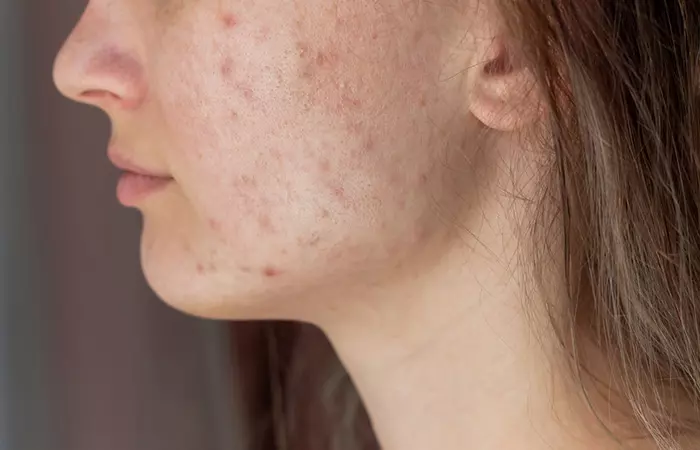
We mentioned earlier that ghee could facilitate an overgrowth of Malassezia furfur on your skin and worsen an existing skin condition. Avoid using ghee if you:
- Have eczema, psoriasis, or seborrheic dermatitis.
- Have oily and acne-prone skin, as ghee may clog the skin pores and cause breakouts.
- Are allergic to milk.
Using ghee may cause eczema and psoriasis flare-ups and lead to:
- Skin rashes
- Redness
- Itching and irritation
- Allergic reactions like hives
Note: Do a patch test to check for any reactions. It is best to consult a dermatologist for advice on your skin type, especially if you have acne-prone skin or sensitive skin conditions.
Infographic: Top 5 Ways To Use Ghee For Skin Care
Ghee is a staple ingredient in Indian households. It is used extensively in cooking and is also a part of several age-old DIY remedies. It is popularly used to moisturize chapped lips. Due to its high nutrient value, it is an active ingredient in Ayurvedic medicine. The infographic below lists the top 5 ways to use ghee in skin care home remedies. Check it out!

Illustration: StyleCraze Design Team
Ghee helps your health in several ways and adds flavor to the dishes. However, ghee carries anti-aging properties that can also benefit your skin in many ways. Consuming ghee can keep your skin glowing and improve its texture. However, it is not advisable to use ghee on the face. Applying ghee on the face can cause fungus growth and aggravate your skin issues like acne. However, many people have tested it on the skin, and claim ghee helps moisturize the skin, prevent dark circles, and heal wounds. Still, it may not suit all skin types, and you may have to be extra careful if you plan to apply it to your skin.
Frequently Asked Questions
What are the best alternatives to ghee for skin care?
You can try shea butter, coconut oil, or almond oil instead of ghee. These options hydrate well and are generally less likely to clog pores.
Can we apply ghee on our faces every day?
Yes, you can apply little amounts of ghee on your face daily to keep your skin supple and healthy. As per anecdotal evidence, ghee benefits for the face include skin brightening and reducing damage from oxidative stress. However, people with oily and acne-prone skin must practice caution while applying ghee on face as it may aggravate acne.
Does ghee make lips pink?
No, ghee does not make your lips pink. However, the application of ghee can make your lips hydrated and reduce dryness (11).
Does ghee have retinol?
Yes, ghee is rich in vitamin A, which is used to create retinol. Retinol boosts collagen production and improves the appearance of your skin (12), (13).
Does ghee have collagen?
Yes, ghee contains vitamin A that is essential in boosting cell growth and collagen production (14).
Illustration: Is Ghee Beneficial For The Skin?
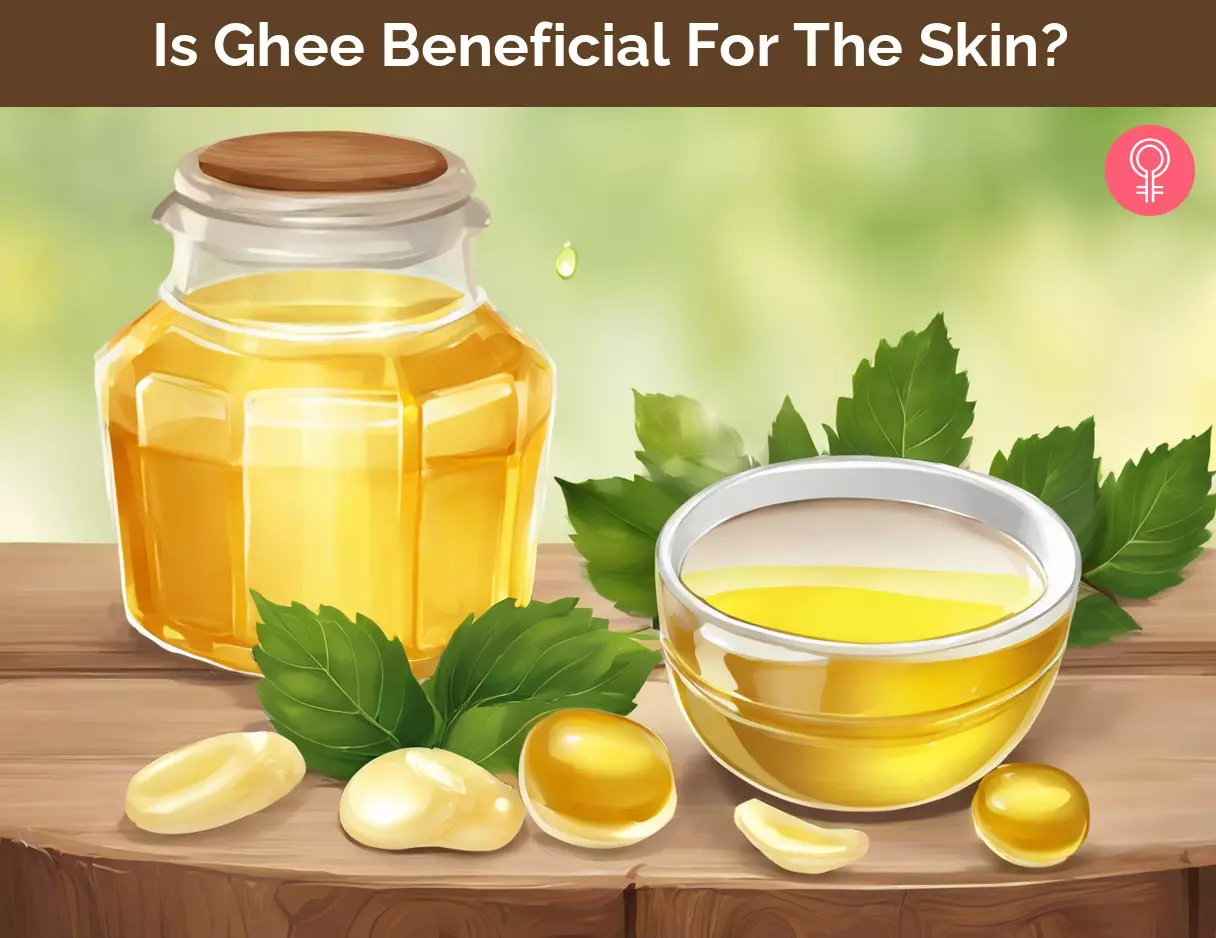
Image: Stable Diffusion/StyleCraze Design Team
Discover the best Ayurvedic remedies for dry skin. Check out the video to learn how to make a nourishing ghee cream moisturizer to keep your skin hydrated and healthy.
Personal Experience: Source
StyleCraze's articles are interwoven with authentic personal narratives that provide depth and resonance to our content. Below are the sources of the personal accounts referenced in this article.
i. DIY Beauty Hack! Using Butter (Ghee) To Get Rid of Dry Lips | Deepica Mutyalahttps://www.youtube.com/watch?v=VqiEzA92ZPY
References
Articles on StyleCraze are backed by verified information from peer-reviewed and academic research papers, reputed organizations, research institutions, and medical associations to ensure accuracy and relevance. Read our editorial policy to learn more.
- Study of the growth of Malassezia furfur on mycological culture media supplemented with different lipid sources https://www.researchgate.net/publication/345495920_Study_of_the_growth_of_Malassezia_furfur_on_mycological_culture_media_supplemented_with_different_lipid_sources
- Ghee-based all-purpose herbal cream of medicinal use
https://www.researchgate.net/publication/343127300_Ghee-based_all-purpose_herbal_cream_of_medicinal_use - The effect of ghee (clarified butter) on serum lipid levels and microsomal lipid peroxidation
https://www.ncbi.nlm.nih.gov/pmc/articles/PMC3215354/ - Ghee and Honey Dressing for Infected Wounds
https://www.ncbi.nlm.nih.gov/pmc/articles/PMC3144338/ - In-House Preparation and Standardization of Herbal Face Pack https://www.semanticscholar.org/paper/In-House-Preparation-and-Standardization-of-Herbal-Pal-Pal/e47d35a89c587c622323b5a7fc4e30f55d5be6df?p2df
- Dual Effects of Alpha-Hydroxy Acids on the Skin
https://www.ncbi.nlm.nih.gov/pmc/articles/PMC6017965/ - Honey: A Therapeutic Agent for Disorders of the Skin
https://www.ncbi.nlm.nih.gov/pmc/articles/PMC5661189/ - Effects of Turmeric (Curcuma longa) on Skin Health: A Systematic Review of the Clinical Evidence
https://pubmed.ncbi.nlm.nih.gov/27213821/ - Sandalwood Album Oil as a Botanical Therapeutic in Dermatology
https://www.ncbi.nlm.nih.gov/pmc/articles/PMC5749697/ - In vitro anti-inflammatory and skin protective properties of Virgin coconut oil
https://www.ncbi.nlm.nih.gov/pmc/articles/PMC6335493/ - Butter, Clarified butter (ghee)
https://fdc.nal.usda.gov/fdc-app.html#/food-details/171314/nutrients - Improvement of Naturally Aged Skin With Vitamin A (Retinol)
https://www.researchgate.net/publication/6316137_Improvement_of_Naturally_Aged_Skin_With_Vitamin_A_Retinol - Improvement of Naturally Aged Skin With Vitamin A (Retinol)
https://www.researchgate.net/publication/6316137_Improvement_of_Naturally_Aged_Skin_With_Vitamin_A_Retinol - Vitamin A Antagonizes Decreased Cell Growth and Elevated Collagen-Degrading Matrix Metalloproteinases and Stimulates Collagen Accumulation in Naturally Aged Human Skin1
https://www.sciencedirect.com/science/article/pii/S0022202X15407985
Read full bio of Dr. CP Thajudheen
Read full bio of Annie Jangam
Read full bio of Ramona Sinha
Read full bio of Medha Deb






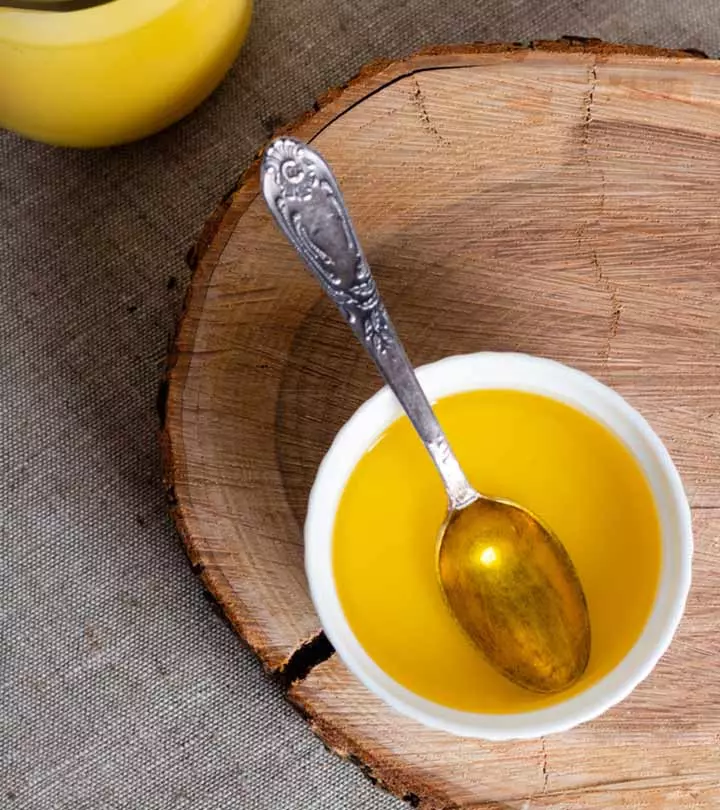
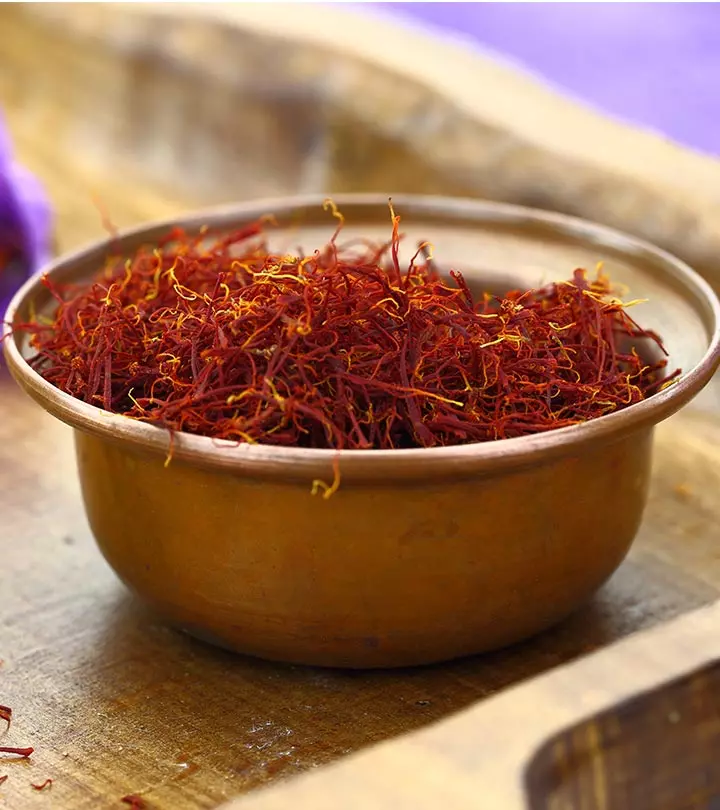
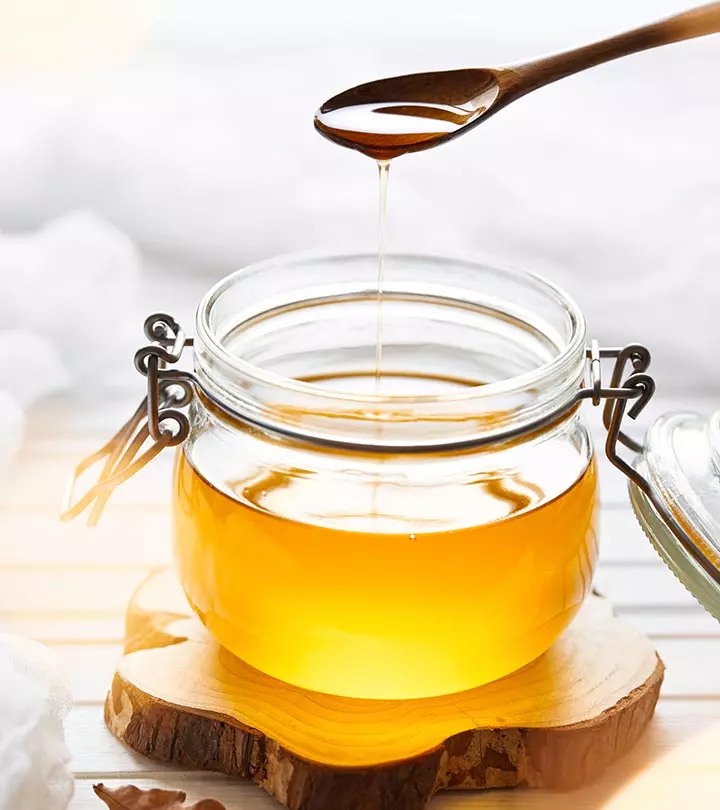
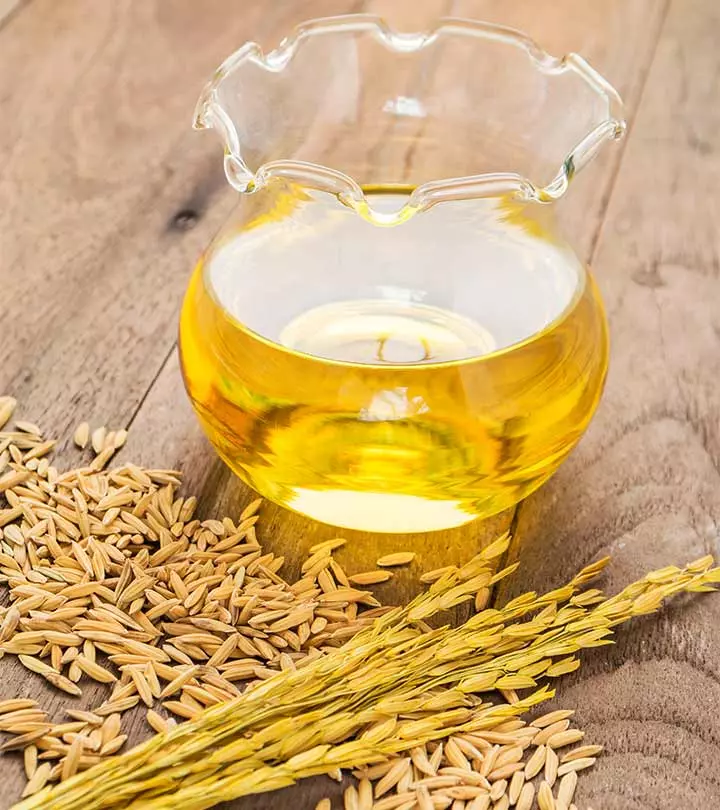
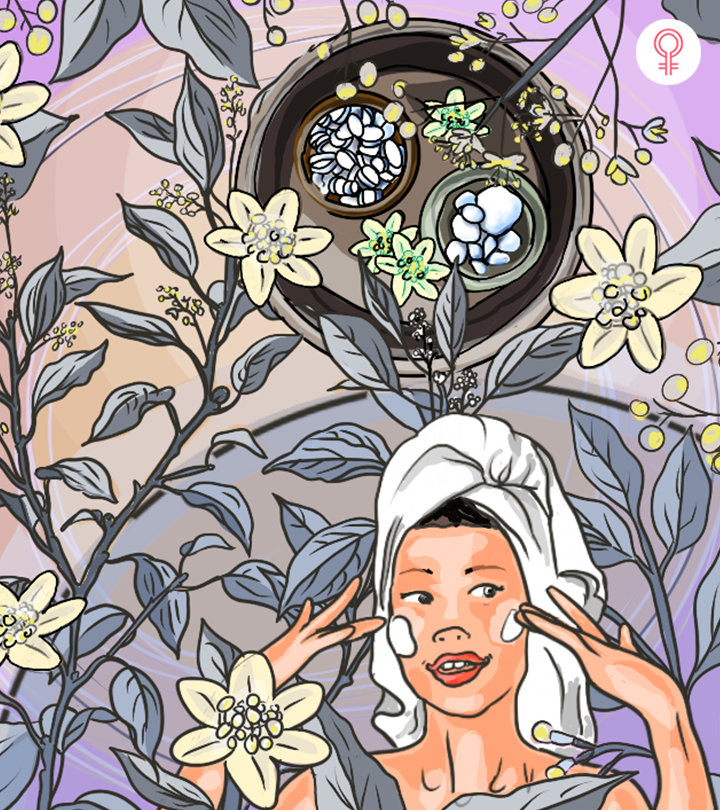
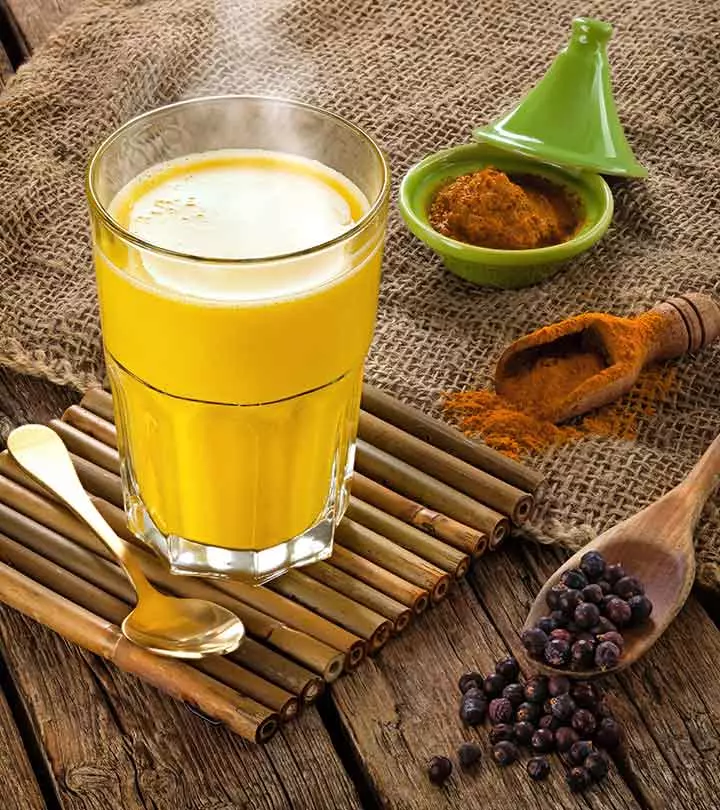

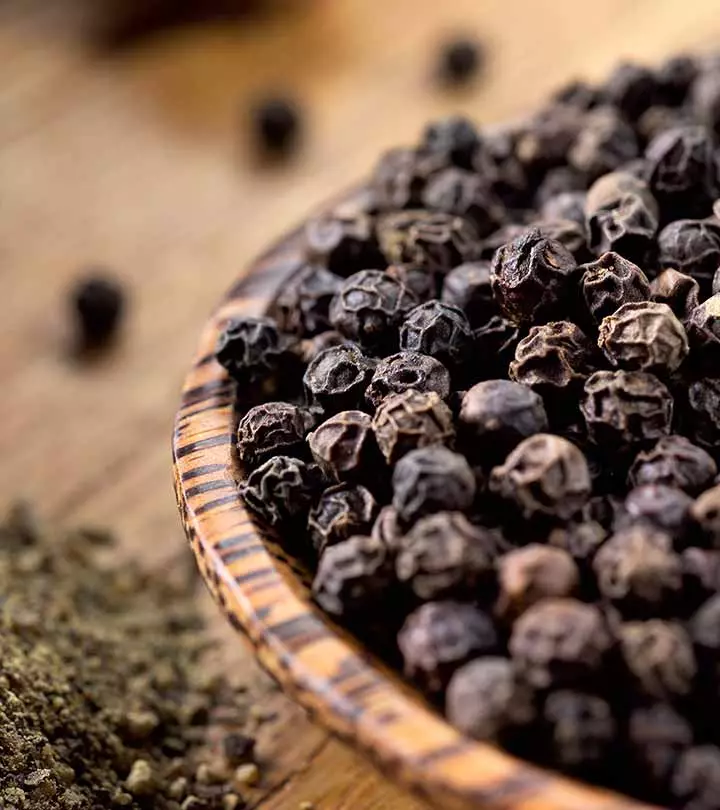

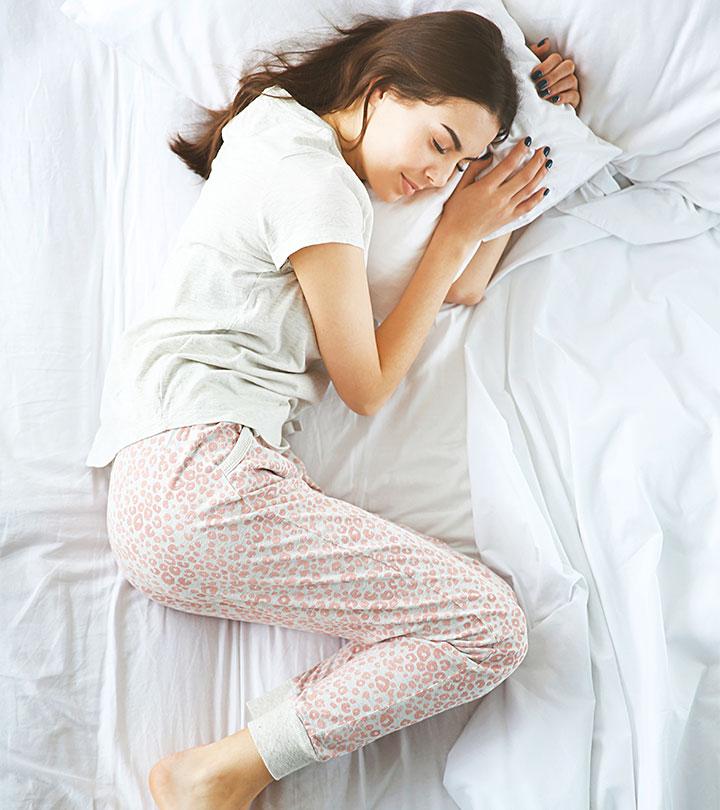
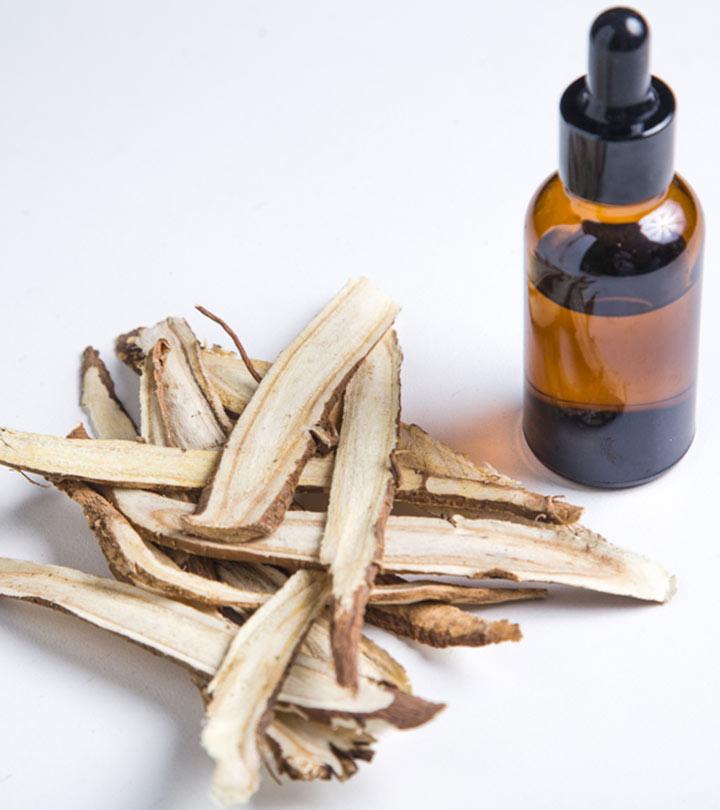
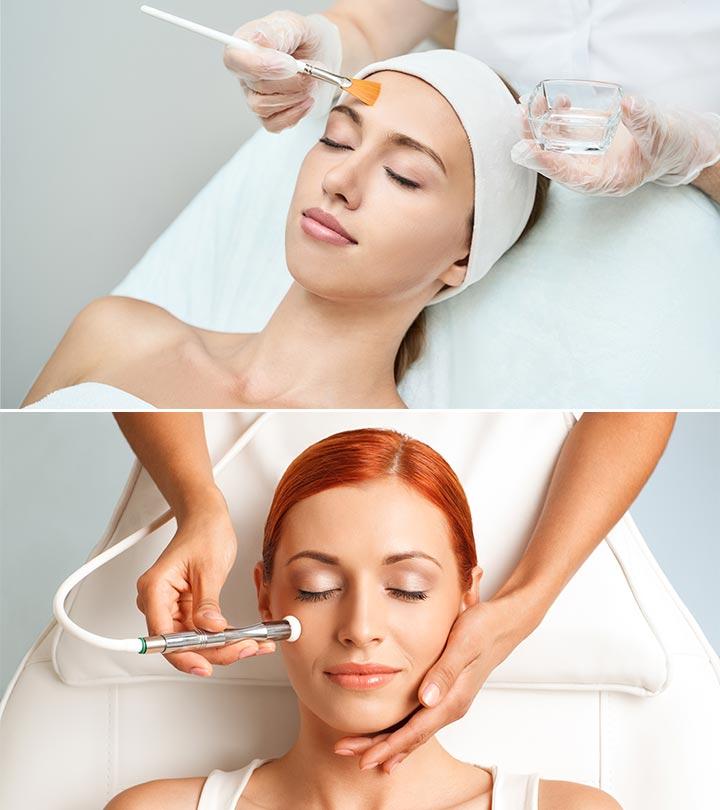
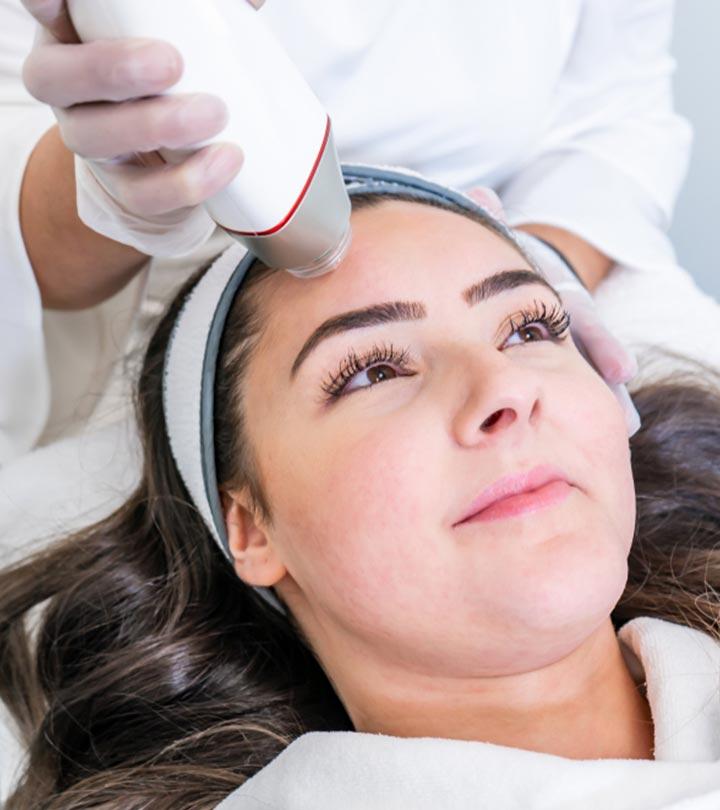
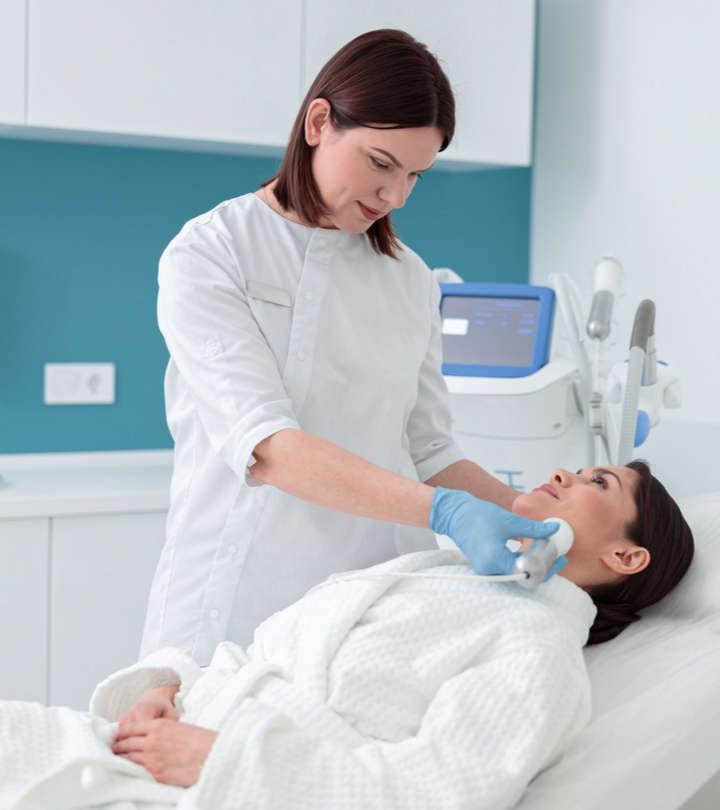
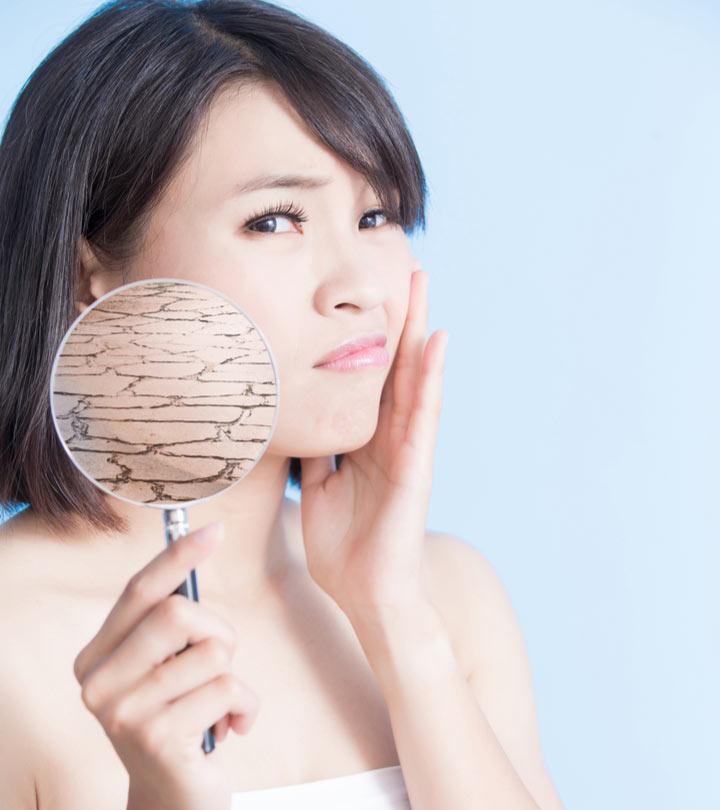
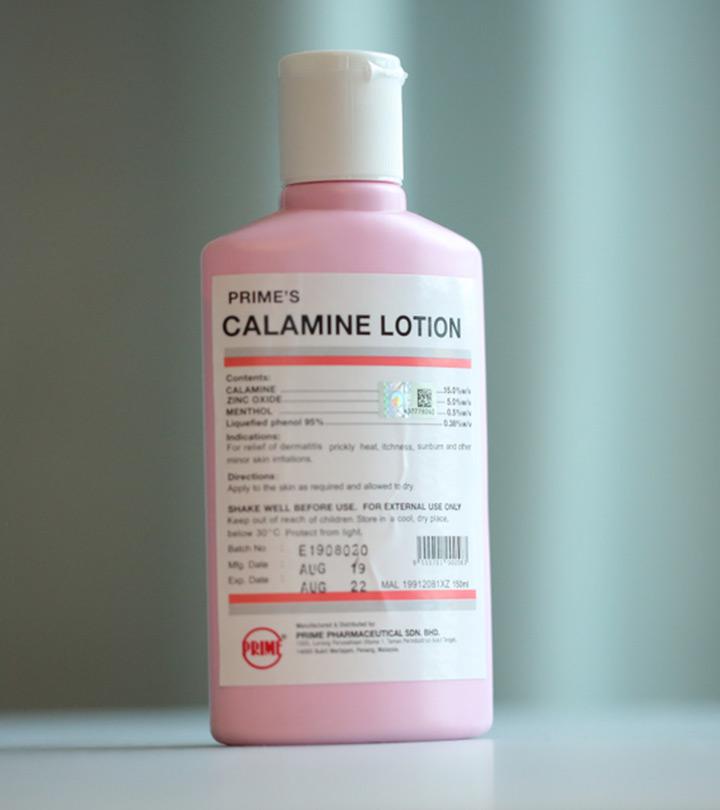
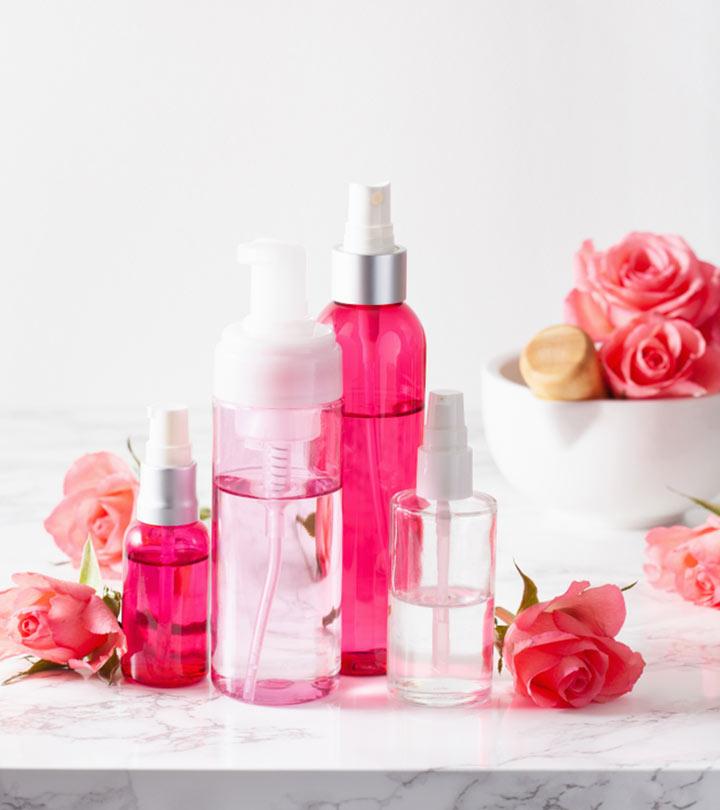
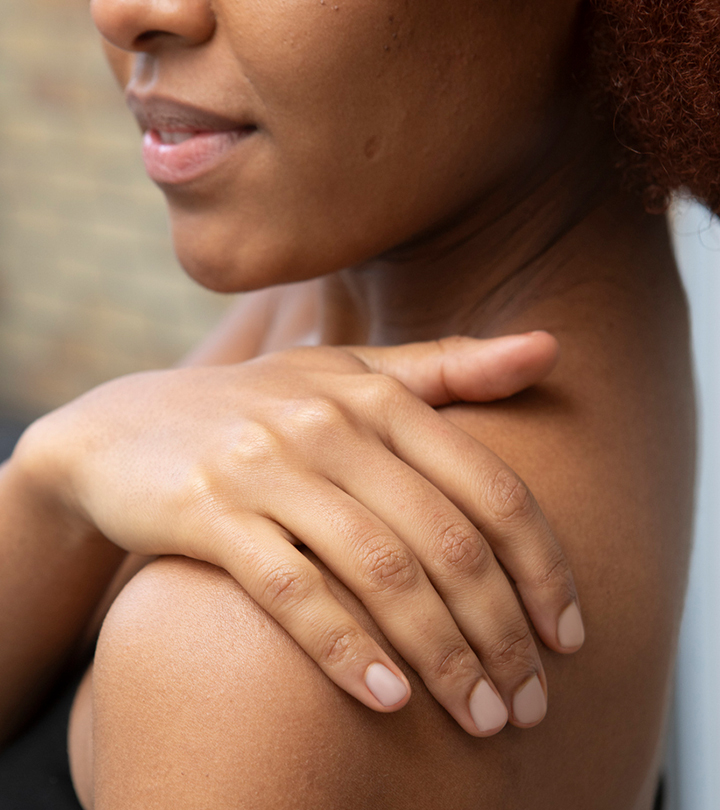
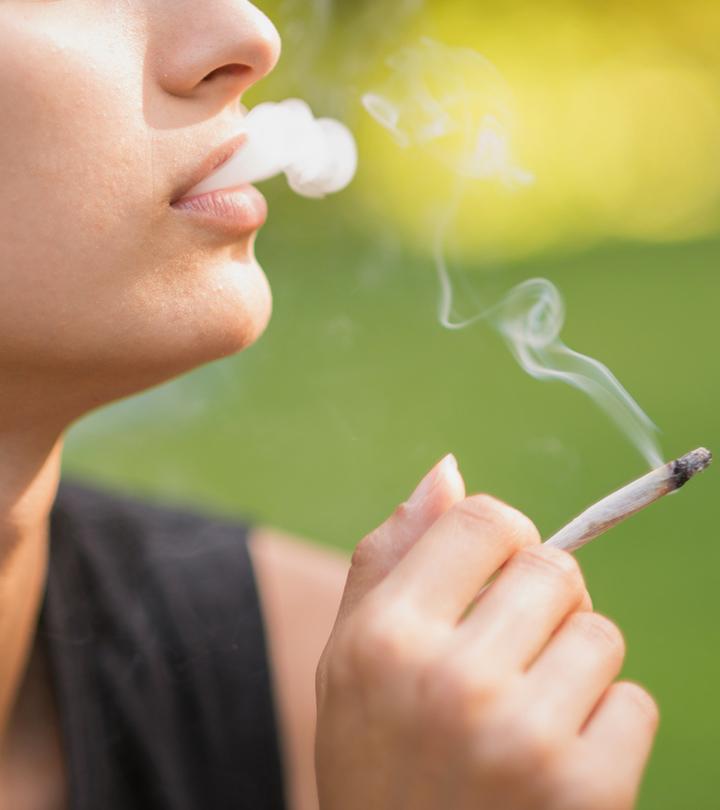
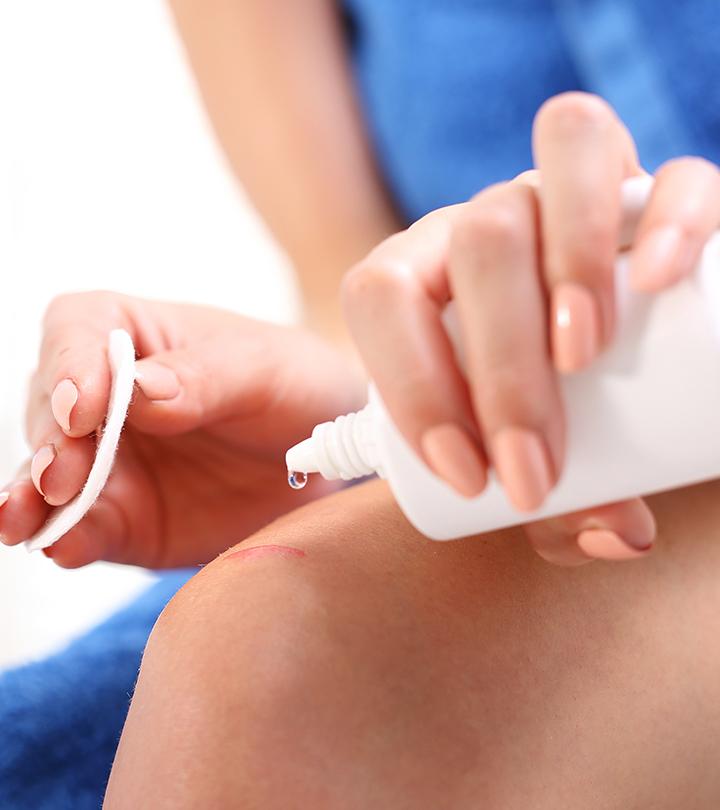
Community Experiences
Join the conversation and become a part of our empowering community! Share your stories, experiences, and insights to connect with other beauty, lifestyle, and health enthusiasts.